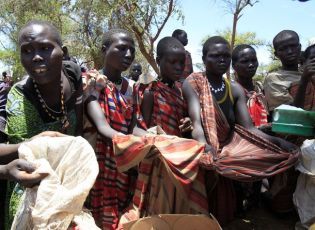WFP to step up food security intervention ahead of referendum in South Sudan
July 7, 2010 (JUBA) — The World Food Program (WFP) has said it will preposition up to eighty thousand (80,000) tons of food in all the ten states of Southern Sudan which can feed about half of the population in the region for six months.

The head of the World Food Program also added that the organization will begin to work on two years long term plan projects including providing capacity building training to the citizens of Southern Sudan in order to sustain the activities currently carried out by the organization.
It also announced that it will also take the responsibility of connecting counties in the South with feeder roads while the government will focus on trunk roads in the region.
The Vice President stressed the importance of the WFP stepping up its work in Southern Sudan, particularly during this crucial period ahead of the conduct of the referendum.
He appealed to the Regional Director of the WFP to make the necessary preparations in order to avoid any humanitarian disaster in case of insecurity and hunger during the referendum.
Machar also said the Government of Southern Sudan has earmarked seventy million (70 million) Sudanese pounds towards food security plans in the region. The money will be availed to the ministry of Agriculture and Forestry.
(ST)

Padiet Deng Alony
WFP to step up food security intervention ahead of referendum in South Sudan
FACTORS CONTRIBUTING TO FOOD INSECURITY
War (not only between north and south but between southern factions too)
Weather
Human disease
Animal disease
Lack of infrastructure
Terrain
Insects and parasites
How do the above affect food security?
War: takes men for fighting so fewer available for cultivation and leaving female
headed households
causes displacement so interrruptions to cultivation and harvest
people lose the will or confidence to cultivate
crops get burnt in the field or stolen from storage
markets disrupted
livestock are looted
general breakdown of society and loss of property
interruptions of grazing and cattle movements
insecurity, or fear of it, interferes with development programmes
Weather: inconsistent rainfall, total amount and distribution
recurring floods and drought, with much local variation, cropping
always uncertain.
Terrain: the flatness makes drainage difficult and many places become a sea of mud
in the wet season , restricting movement and making roads difficult to
maintain.
Much clay soil, which is liable to set hard or become water logged, limiting
the period of easy cultivation either by hand, by oxen or by tractors.
Lack of infrastructure: roads are non existent or beyond repair, hardly any trucking
system, limited river navigation
no grain storage system
no stock routes or slaughter slabs
lack of basic amenities
no government services
no market structures
Human disease: affect on labour for cultivation eg guinea worm, kala azar, TB,
brucellosis, malaria, gut worms, relapsing fever,
schistosomiasis and malnutrition.
Animal disease: lowering productivity eg CBPP, internal parasites,
trypanosomosis, brucellosis, TB, HS, anthrax, blackquarter,
malnutrition
Insects and parasites: the ecology promotes huge parasite transmission eg liver
fluke, amphistomes, schistosomiasis, guinea worm, and gut
nematodes.
Nuisance effect and disease transmission potential of flies on
people and animals: house flies, Stomoxys, mosquitoes,
Tabanidae and Hippoboscidae.
mohammed ali
WFP to step up food security intervention ahead of referendum in South Sudan
The main factor contributing to hunger, starvation and loss of human dignity is CORRUPTION!
80,000 mt of any type of grain which will feed 50% ofthepoulation will cost less than $ 40 million !